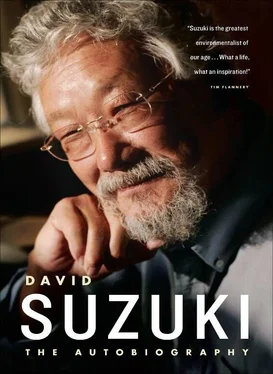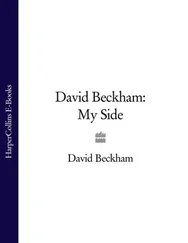He was also a dreamer. His parents were constantly nagging him to go out and make money and save for a home and security. As the eldest in a family of seven children, he was expected to be a role model for his brothers and sister, but he wasn't the kind his parents had in mind. He was not afraid of work and labored hard to earn enough to buy the necessities in life, but he didn't believe that we should run after money as an end in itself. He taught us it was bad manners to talk about money with others; we learned to pity the person who bragged about money, new cars, or fancy clothes. Dad loved fishing and gardening, and he was fascinated by plants. To my grandparents, he was a failure, and they constantly berated him to do better, but to me, he was my great hero and role model.
Dad loved to go on fishing, camping, and mushroom-hunting trips in the mountains, where he often encountered First Nations people. He would easily strike up conversations and often ended up being invited for dinner or to stay with them. In the mid-1960s, when he had returned to Vancouver, he became close friends with a Native family near Boston Bar along the Fraser River. On fishing trips he would often stop off to stay with them, and when they came to town, they and their children would drop in to visit and stay with him and Mom.
Once, I accompanied him on a trip to hunt for matsutake , aromatic pine mushrooms that are highly prized by Japanese. On that trip, I met this First Nations family. I was surprised at how uptight I was in contrast to my father, who felt right at home. I, a young professor in genetics, had never met Native people and only knew about them from snippets in the media. I knew nothing about Dad's friends or their background, and I didn't know how to relate to them in conversation. Dad was relaxed and simply accepted them as people who shared his interest in fish, trees, and nature, so he easily raised subjects of mutual interest about which they could converse for hours. But I felt alien and was especially afraid I might say something that would be insulting or patronizing. I was overwhelmed by the fact that they were Indians, and I never allowed our basic humanity to be the main point of interaction. They probably wondered about this guy who had a great father but was too snooty to say much.
Dad's great characteristic was that when he met people, he was totally open, because he was genuinely interested in what they could tell him about their experiences and their world. Naturally, people loved him, because everyone loves to talk about him- or herself, and he was a terrific listener. I realize now that he automatically exhibited the quality that First Nations people tell us is so critical in order to communicate: respect. It would be a long time before I realized how much our shared genetic heritage — that is, our physical features — made First Nations people immediately more receptive to me.
Mom was a traditional Japanese wife, never arguing with or contradicting Dad in front of us or company. Her entire life was circumscribed by work. She was the first up in the morning and the last to go to bed at night, but I never heard her complain or nag my father. She took care of the family's finances, and as each of her kids began to babysit, waitress, or do farm work or construction, all of our earnings went to her. We didn't get an allowance; Mom and Dad bought our clothes, books, and other things we needed and from time to time doled out a little change for a treat, but I was never overwhelmed by a need for anything. I never acquired an interest in clothing fashions, perhaps because my parents bought my clothes for me. To this day, my wife tells me I don't know about color coordination when my socks clash with my shirt, something I still can't figure out. What on earth has the color of my socks got to do with the color of my shirt?
Mom's greatest gift to me was her unfailing interest in what I was doing. My sanctuary as a teenager when we lived in London was a swamp, and I would go home soaking wet, often covered in mud, but triumphantly brandishing jars of insects, salamander eggs, or baby turtles. She never scolded me but would ooh and aah over each little treasure as she helped me take off my clothes so that she could launder them.

Marcia and me on our first day of kindergarten, September 1941
In Vancouver, our next-door neighbors were the McGregors, steadfast friends to my parents. Their youngest son, Ian, was my playmate. The issue of race is not something I remember from those carefree days. On my first day of kindergarten, in 1941, I happily undressed to my undershorts in front of all the parents and without any sense of self-consciousness climbed onto a table to be examined by a doctor, although my parents told me later they were embarrassed that I undressed in front of the white parents.
The rest of my childhood memories are filled with fishing and camping excursions with Dad. We would make trips past Haney, then very rural but now on the eastern outskirts of Greater Vancouver, to fish in Loon Lake, a small lake so full of trout that most were stunted, growing to perhaps seven or eight inches at best. That's where I caught my first trout, for a limit of fifteen, while Dad practiced his fly-fishing. Today Loon Lake is part of the University of British Columbia's Demonstration Forest.
On other occasions, we would drive out to the Vedder Canal near Chilliwack in the Fraser Valley, where Dad arranged for horses so we could ride several miles upstream and camp. I was always fascinated that we could let the horses go at the end of our ride, and they would find their way home. Dad would catch steelhead and Dolly Varden trout as we fished down the river. The first time we went, I accidentally slipped off a rock and into the water. Looking up at Dad, I expected him to chastise me to be more careful. Instead, he told me to go ahead and jump into the creek and have fun — with my clothes on! It was wonderful.
Thinking back on my childhood, I understand that children live in a world of their own making, a fantasy life of real experiences, dreams, and imaginings that are jumbled together in the early state of coalescence into the filtering lenses through which we will see the world as adults. Even as an elder, I find those recollections changing as, more and more, I find my “memories” really are created by priceless photos, like the one of me dripping wet, rather than actual recall of the events.
Buffered from the world by my parents, I didn't know Japan had attacked Pearl Harbor in Hawaii on December 7, 1941, and I didn't sense any fear or consternation in Mom or Dad. Many years later, my father told me that when he heard the announcement of the attack, he immediately went to a barber and had his hair restyled into a crew cut, which he retained for the rest of his life. “I knew we were going to be treated like ‘Japs,' so I figured I might as well look like one” was the way he put it. Cutting his hair was an act of both defiance and submission to what he knew was inevitable. The treachery implicit in Japan's “sneak attack” against the United States Navy and the terrible war that followed threw my family and some twenty thousand other Japanese Canadians and Japanese nationals into a turbulent sequence of events, beginning with Canada's invocation of the iniquitous War Measures Act, which deprived us of all rights of citizenship.
In 1941, Canada was still a racist society. In Prince Rupert in northern British Columbia, First Nations people existed under conditions akin to apartheid in South Africa: they were not allowed to stay in most hotels, they were refused service in restaurants, and they were forced to sit in certain designated sections of theaters. There were also prohibitions against any First Nations person in pubs. (My uncle Mar, who was quite swarthy, was once asked in a bar what tribe he was from. He replied, “The Jap tribe.”)
Читать дальше



![David Jagusson - Devot & Anal [Hardcore BDSM]](/books/485905/david-jagusson-devot-anal-hardcore-bdsm-thumb.webp)









